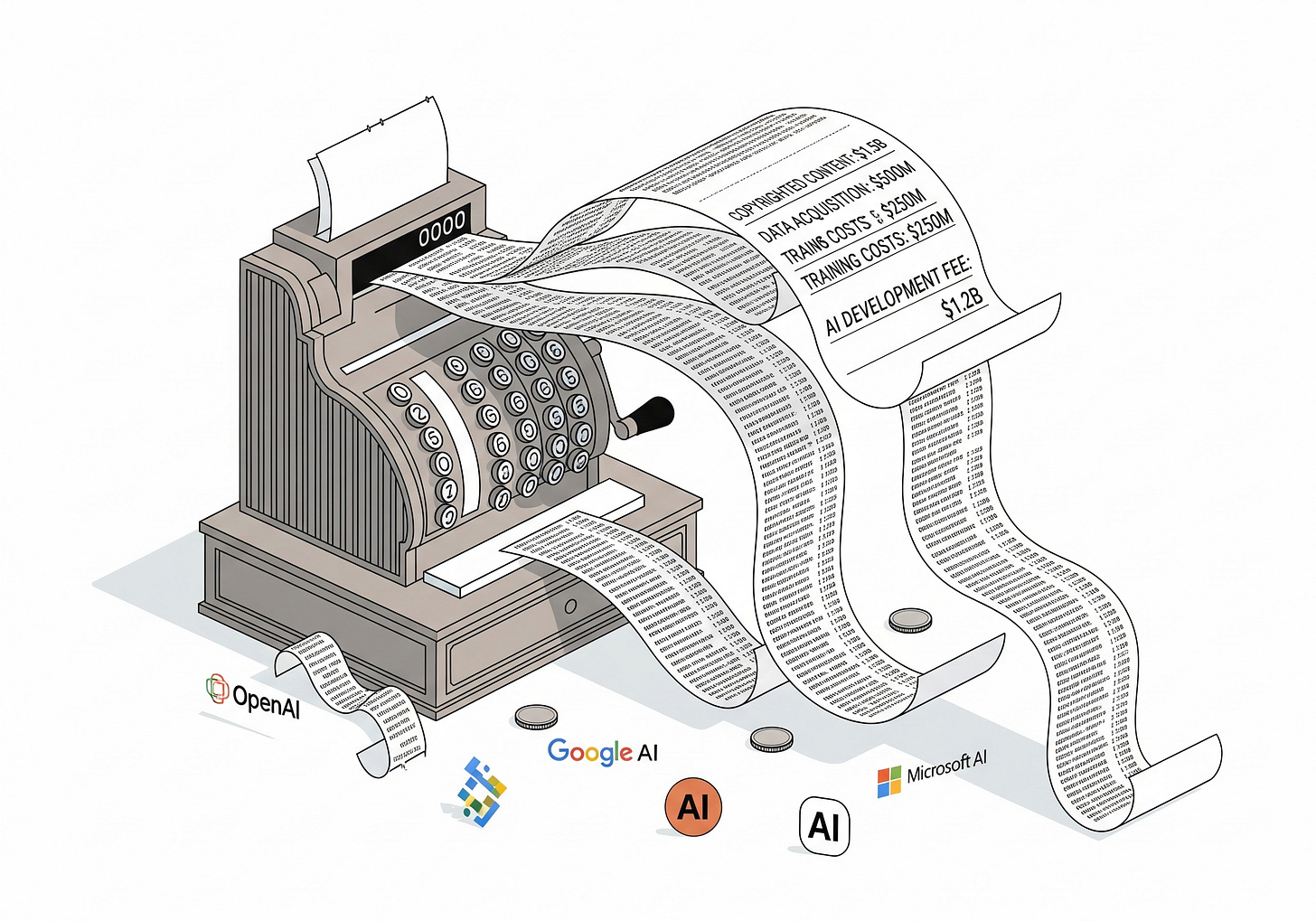Week 36: AI Pays $5 Billion in One Week, Bots Crash Sites, Tesla Admits Defeat
THE BILL COLLECTORS ARRIVE
The party's over and everyone wants their money. This week, AI companies discovered that "disruption" comes with receipts — $1.5 billion to authors, $3.5 billion in fines, plus whatever Warner Bros extracts for Superman. From copyright lawyers to regulators to crashed websites, everyone's presenting invoices for services AI never asked to pay for. Turns out the future isn't free after all.
TIME TO PAY UP
Authors Cash Their Check as Anthropic writes a $1.5 billion settlement for using copyrighted books without asking, setting the price for everyone else's stolen content. Superman Sends Invoice when Warner Bros sues Midjourney for generating Batman and Superman images, because even AI can't escape IP lawyers.
THE ENFORCEMENT SQUAD
Europe Collects $3.5 Billion from Google for monopolizing ads, proving regulators have discovered AI companies actually have money. States Protect Their Kids as US Attorneys General warn OpenAI that ChatGPT better stay away from children or face consequences.
REALITY SENDS ITS BILL
Bots Destroy What They Touch as AI crawlers crash news sites by ignoring robots.txt files, taking content while leaving server bills. Tesla Downgrades Dreams by redefining "Full Self-Driving" to mean something less than full or self-driving.
Curious what it all adds up to? Let’s break it down. Keep reading below.
Tell Me More
The Opening Tab at the IP Bar. Anthropic's $1.5 billion payment isn't a settlement — it's the cover charge for entering the content business. Every AI company just discovered their training data wasn't free samples but a very expensive buffet they've been dining and dashing from. This sets the minimum price for "we accidentally used your entire life's work without asking." Publishers, artists, and your grandmother's recipe blog are all updating their invoices. The era of "it's easier to ask forgiveness" just got a price tag.
When Superheroes Call Their Lawyers. Warner Bros suing over Batman deepfakes proves that even fictional billionaires have real lawyers. This isn't about protecting Superman's image — it's about establishing that every pixel has a price. AI companies are learning that "generative" doesn't mean "free to generate anything." The endgame? Every prompt will need a licensing check. "Draw me Batman" will cost extra, like in-app purchases for reality.
Europe's ATM Opens for Business. The EU's $3.5 billion Google fine isn't regulation — it's a business model. Europe discovered that American tech companies are basically ATMs: insert violation, extract billions. This systematic wealth transfer from Silicon Valley to Brussels will fund whatever Europe does instead of building tech companies. Expect quarterly fines like earnings reports. Google's real product in Europe isn't ads — it's being rich enough to fine.
Think of the Children (and Their Lawyers). Attorneys General warning OpenAI about child safety isn't concern — it's discovery. They smell blood in the water and class-action settlements in their future. "Protecting kids" is the universal key that unlocks unlimited litigation budgets. ChatGPT's real risk isn't that it might harm children — it's that harming children is really expensive. Every AI company just added "pediatric legal defense fund" to their budget.
The Parasite Economy. AI bots crashing news sites while stealing their content is perfect metaphor for the entire industry. They take everything, give nothing back, and leave you with the hosting bill. Publishers thought paywalls would save them from Google — instead they got murdered by crawlers that can't even click ads. The solution? Start charging AI companies rent for existing on the internet. Call it a "consciousness tax."
Dreams Adjusted for Reality. Tesla admitting Full Self-Driving isn't is like your drug dealer announcing the cocaine was actually flour. After years of "next year" promises, they're finally acknowledging that "full" means "partial" and "self" means "you." This isn't a pivot — it's an admission that physics exists. Every autonomous vehicle company just breathed a sigh of relief that someone else admitted it first. The future of driving: humans, but with more expensive cars.
Below The Fold
A Navajo artist wove a 555 timer circuit into traditional fabric, proving art meets tech in unexpected ways. righto.com
AI-powered DJ app BeeBot promises to capture your "local neighborhood zeitgeist," which sounds like gentrification with algorithms. Teendrama
Jeff Tweedy explored guitars that prioritize looks over playability, the musical equivalent of fashion over function. Jeff Tweedy's Substack
One startup hit $40M ARR being "ruthlessly intense" yet "insanely generous," proving you can have toxic culture both ways. Next Play So
New podcast asks "Where's the Fun in AI Gambling?" — spoiler: there isn't any, just faster ways to lose money. Wired Uncanny Valley Podcast
Someone ditched Spotify for self-hosted music, trading convenience for the smug satisfaction of digital independence. leshicodes.github.io
Instagram finally launched an iPad app, because apparently we needed bigger screens for our doom scrolling. The Verge
Putin, Xi, and Kim caught discussing immortality through organ transplants, because supervillains gonna supervillain. Ars Technica
Scientists turned sperm into magnetically controlled robots, answering a question literally nobody asked. Interesting Engineering
France launched a "nature-inclusive" wind farm, which is just a wind farm that feels bad about killing birds. Interesting Engineering
Looking Ahead: The bill collectors aren't done. Next week expect more invoices, more fines, and more companies discovering that "disruption" is just another word for "defendant."
Thanks for reading Briefs — your weekly recap of the signals I couldn't ignore. This week that meant reading 913 stories from 47 sources. You're welcome.


